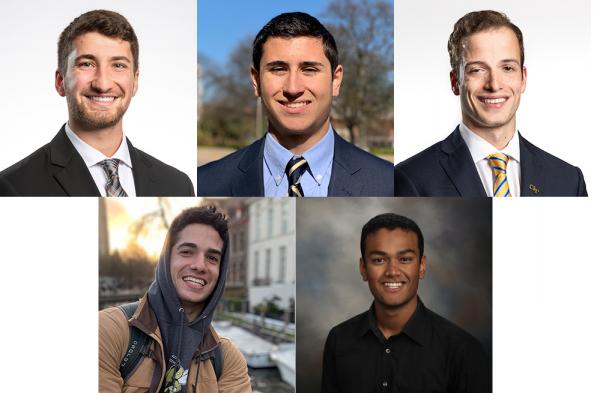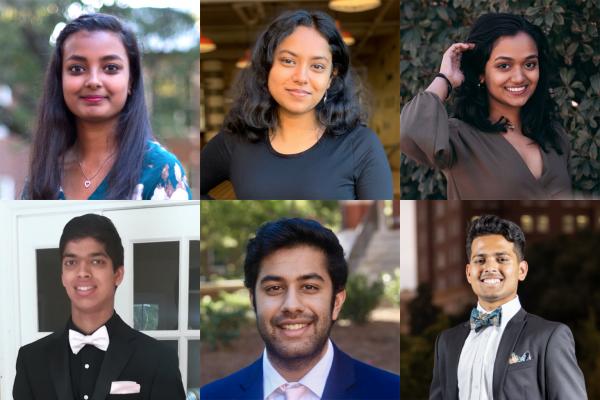Three Georgia Tech interdisciplinary engineering student teams were among the four declared winners in their category at the MIT COVID-19 Challenge event held April 3-5. The online, virtual hackathon event attracted 1,500 people, creating 240 teams, which competed for monetary prizes, computing resources, organizational support, and direct access to key partners to further develop, validate and implement solutions developed. The 2020 MIT COVID-19 Challenge attracted more than 50 partnering organizations.
Teams could participate in one of 10 Covid-19 healthcare-related tracks. Judges selected the “final four” winners for each of the ten tracks to receive prize money and support for their presentations and ideas.
The three winning Georgia Tech teams were:
Medlynk, a five-person Georgia Tech team, won for their tracking model focused at the county level that pulls from multiple live data sources to allow hospitals to predict their personal protected equipment (PPE) burn rate, and identifies hospitals in critical need to help suppliers prioritize hospitals needs and more appropriately direct their supplies of PPE equipment.
The Medlynk team won in the Hospital Assets Coordination, and Distribution category.
The winning members of the team included: Mike Adamo (BME), Brandon D’arienzo (ME), Maximilian Hollister (BME), Sebastian Hollister (CS), and Akash Moozhayil (ME).
PopTracker, a seven-person team with six Georgia Tech students, won for designing a low-cost mesh network system of devices to report population densities in public transport by polling train cars for Wi-Fi signals from devices, which then sends the information to a web application's database for analysis, visualization and public use. Public transit users can then go online to see live data for where they should go for the least crowded train possible to maintain social distancing.
The popTracker team won in the Impact of Social Distancing and Quarantine category.
The winning members of the team included: Thomas Beckler (BME), Ricardo Meizoso (ME), Nick Mirchandani (ID), Leo Ricci (CS), Davis White (BME), Jaime Vera (BME), and Olivia Khan (co-founder, Generous Labs in Germany).
ReRoute, a six-person Georgia Tech team, won for reducing the chance of COVID-19 transmission within a hospital setting. The team developed a new term called “clinical distancing.” In order to do this, their solution called reRoute, is implemented by scanning passive RFID tags already worn by staff and patients to track personnel flow within the hospital. The tags carry a unique COVID-19 risk factor, generated by analyzing intrinsic and extrinsic health risks with which the users have interacted. Their algorithm then determines the optimal path for moving patients along the relevant hallways and in testing rooms while interfacing with local sensors to redirect traffic and notify custodial units when and where sanitization is needed.
The reRoute team won in the COVID-19 Treatment and Management category.
The winning members of the team included: Manshi Baskaran (BME), Srujani Das (BME), Saisamhitha (Sam) Dasari (BME), Prahlad Iyengar (EE), Sambhav Jain (BME), and Ruturaj Patil (ME).
Media Contact:
Walter Rich
Communications Manager
Wallace H. Coulter Department of Biomedical Engineering
Georgia Institute of Technology
Media Contact
Walter Rich
Keywords
Latest BME News
Jo honored for his impact on science and mentorship
The department rises to the top in biomedical engineering programs for undergraduate education.
Commercialization program in Coulter BME announces project teams who will receive support to get their research to market.
Courses in the Wallace H. Coulter Department of Biomedical Engineering are being reformatted to incorporate AI and machine learning so students are prepared for a data-driven biotech sector.
Influenced by her mother's journey in engineering, Sriya Surapaneni hopes to inspire other young women in the field.
Coulter BME Professor Earns Tenure, Eyes Future of Innovation in Health and Medicine
The grant will fund the development of cutting-edge technology that could detect colorectal cancer through a simple breath test
The surgical support device landed Coulter BME its 4th consecutive win for the College of Engineering competition.









